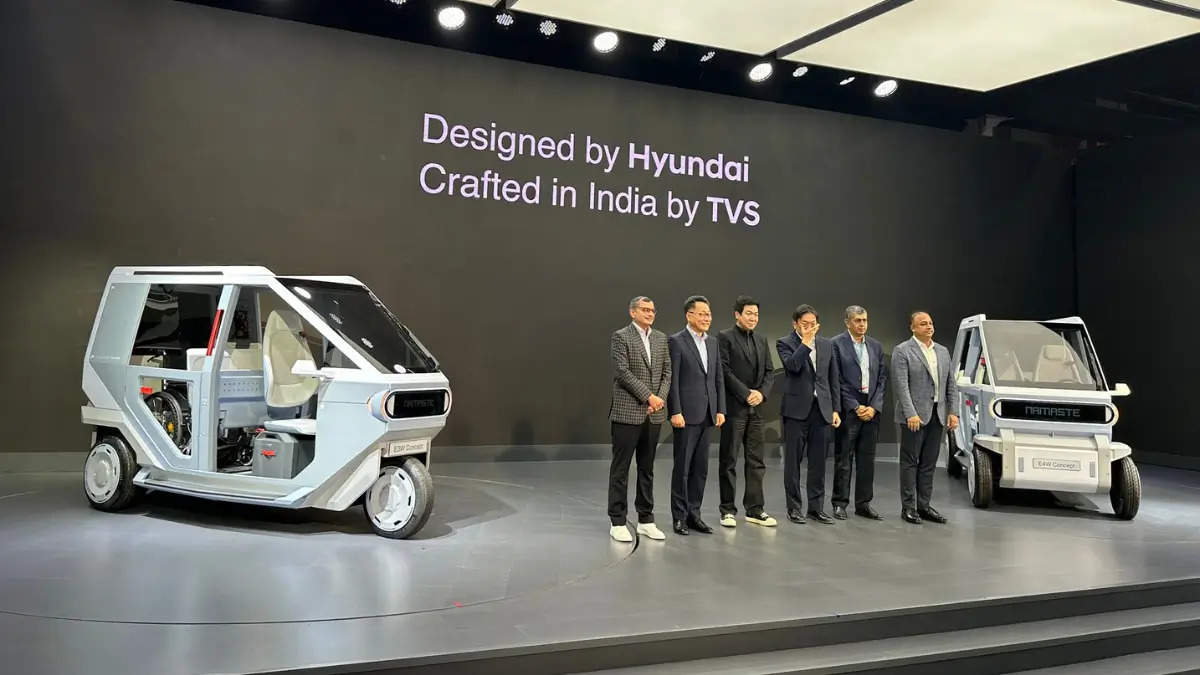
After the launch of electric Creta on day one of Bharat Mobility Global Expo 2025, Hyundai Motor Company (Hyundai) on Saturday, has announced its exploration of a strategic partnership with TVS Motor Company to transform last-mile mobility in India. The South Korean auto major showcased concept models of advanced electric three-wheelers and micro four-wheelers, signaling its commitment to sustainable urban transportation.
The collaboration aims to combine Hyundai’s global expertise in design, engineering, and technology with TVS’s extensive experience in manufacturing and marketing, creating innovative solutions tailored to India’s unique mobility needs. While no binding agreements have been signed, the two companies are in talks to bring these concepts to life.
A vision for sustainable mobility
Hyundai’s futuristic concept vehicles underline its vision of “Progress for Humanity.” These designs are geared toward addressing the challenges of last-mile connectivity in India by prioritizing sustainability, convenience, and adaptability.
“We are committed to creating customer-centric mobility solutions that reflect India’s dynamic transportation landscape,” said SangYup Lee, Executive Vice President and Head of Hyundai and Genesis Global Design. “Our collaboration with TVS Motor aims to blend advanced functionality with the spirit of an innovative India.”
TVS Motor Company’s Sharad Mishra echoed this sentiment, stating, “By combining Hyundai’s global expertise with our local insights, we aim to redefine urban mobility and contribute to a sustainable future.”
Concept vehicles designed for India
The unveiled electric three-wheeler and micro four-wheeler are designed to cater to India’s diverse mobility needs, from daily commutes to last-mile logistics. Key features include:
- Electric Three-Wheeler Concept: A reimagined version of India’s iconic motor rickshaw, offering versatility as a passenger vehicle, logistics solution, or even an emergency response vehicle. Notable features include an angled windshield for enhanced visibility, adjustable height for navigating waterlogged streets, and a foldable seat to accommodate wheelchair users.
- Micro Four-Wheeler Concept: Compact and modular, this vehicle is designed for urban environments, offering flexible storage solutions and intuitive technology to ensure seamless connectivity.
Both vehicles prioritise safety, comfort, and adaptability, with features like extended wheelbases for better ergonomics, flat floors for added comfort, and large tires for navigating rough terrain.
Tailored to Indian conditions
Hyundai has paid close attention to India’s challenging weather and road conditions. The vehicles are designed with water-resistant materials, heat-reducing roof paint, and robust engineering to withstand high temperatures and heavy rainfall. The use of sustainable materials and modular designs also highlights Hyundai’s commitment to responsible innovation.
The vibrant “Aakaashi Blue” color of the vehicles, inspired by the Indian Ocean and sky, symbolizes depth, stability, and the limitless aspirations of the Indian spirit.
Future plans and market potential
Hyundai plans to collaborate with TVS to manufacture the three-wheeler locally, while exploring global opportunities for the four-wheeler. The project is in its initial stages, with feasibility studies underway to analyze integration into India’s urban infrastructure.
These concept vehicles mark Hyundai’s foray into India’s burgeoning last-mile mobility market, which is poised for significant growth. By addressing the evolving demands of Indian cities, Hyundai and TVS aim to reshape urban transportation and enhance connectivity for millions.
A shared vision for progress
Hyundai’s exploration of a partnership with TVS reflects a shared vision of innovation, sustainability, and customer-centric design. Together, the companies aim to set new standards in mobility, contributing to India’s progress and creating impactful solutions for a rapidly changing world.
As discussions progress, these concepts pave the way for a future where urban mobility is smarter, greener, and more inclusive.
















